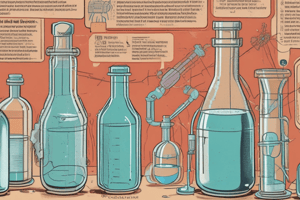Podcast
Questions and Answers
How much PbSO4 can be produced by the addition of 25 mL of a 0.50 M solution of aluminum sulfate to excess lead(II) nitrate?
How much PbSO4 can be produced by the addition of 25 mL of a 0.50 M solution of aluminum sulfate to excess lead(II) nitrate?
- 3.8 g
- 3.00 g
- 11.4 g (correct)
- 1.26 g
What volume of 0.0250 M HNO3 solution is needed to fully react with 12.5 mL of a 0.0100 M Ca(OH)2 solution?
What volume of 0.0250 M HNO3 solution is needed to fully react with 12.5 mL of a 0.0100 M Ca(OH)2 solution?
- 15.0 mL
- 20.0 mL (correct)
- 10.0 mL
- 12.5 mL
Based on the balanced reaction, how much Cl2 is needed to react with 60.0 g of NaOH?
Based on the balanced reaction, how much Cl2 is needed to react with 60.0 g of NaOH?
- 14.6 g
- 106 g
- 26.6 g (correct)
- 142 g
What is the concentration of a solution after 25.00 mL of a 3.50 M NaOH solution is diluted to 500.0 mL?
What is the concentration of a solution after 25.00 mL of a 3.50 M NaOH solution is diluted to 500.0 mL?
What is the oxidation number of sulfur in Na2S2O8?
What is the oxidation number of sulfur in Na2S2O8?
Which of the following metals would dissolve in a solution of Ni(NO3)2?
Which of the following metals would dissolve in a solution of Ni(NO3)2?
How much 0.500 M HNO3 is required to dissolve 27.0 g of Al?
How much 0.500 M HNO3 is required to dissolve 27.0 g of Al?
What is the mass of NaCl produced when 60.0 g of NaOH react with Cl2?
What is the mass of NaCl produced when 60.0 g of NaOH react with Cl2?
What is the maximum amount of PbI2 that may precipitate when 2.57 g of Pb(NO3)2 and 2.28 g of KI are reacted?
What is the maximum amount of PbI2 that may precipitate when 2.57 g of Pb(NO3)2 and 2.28 g of KI are reacted?
How many of the following ionic compounds are soluble in water: BaSO4, AgBr, Sr(NO3)2, PbS, Na2CO3?
How many of the following ionic compounds are soluble in water: BaSO4, AgBr, Sr(NO3)2, PbS, Na2CO3?
Which statement accurately describes the effect of dissolving sodium nitrite in water?
Which statement accurately describes the effect of dissolving sodium nitrite in water?
What is the net ionic reaction for the reaction between potassium chloride and lead(II) nitrate?
What is the net ionic reaction for the reaction between potassium chloride and lead(II) nitrate?
What is the molarity of a sulfuric acid solution titrated with 2.19 M NaOH using 16.25 mL of NaOH?
What is the molarity of a sulfuric acid solution titrated with 2.19 M NaOH using 16.25 mL of NaOH?
Which ionic compounds from the following list are insoluble in water? 1. BaSO4 2. AgBr 3. Sr(NO3)2 4. PbS 5. Na2CO3
Which ionic compounds from the following list are insoluble in water? 1. BaSO4 2. AgBr 3. Sr(NO3)2 4. PbS 5. Na2CO3
How does sodium nitrite behave when it is dissolved in water?
How does sodium nitrite behave when it is dissolved in water?
In the reaction of Pb(NO3)2 and KI, what products are formed?
In the reaction of Pb(NO3)2 and KI, what products are formed?
Which compound would most likely produce the least number of ions when dissolved in water?
Which compound would most likely produce the least number of ions when dissolved in water?
Which statement about electrolytes is correct?
Which statement about electrolytes is correct?
Which compounds act as weak acids when dissolved in water?
Which compounds act as weak acids when dissolved in water?
Which combination of compounds will result in a precipitate when mixed in water?
Which combination of compounds will result in a precipitate when mixed in water?
What best describes the acid-base properties of NH4Cl when dissolved in water?
What best describes the acid-base properties of NH4Cl when dissolved in water?
What are the molarities of all ions in the solution after the metathesis reaction between AgNO3 and CaCl2 is complete?
What are the molarities of all ions in the solution after the metathesis reaction between AgNO3 and CaCl2 is complete?
Which of the following is true regarding weak acids in water?
Which of the following is true regarding weak acids in water?
Which solution would likely contain the highest concentration of ions when dissolved?
Which solution would likely contain the highest concentration of ions when dissolved?
Flashcards are hidden until you start studying
Study Notes
Ionic Compounds and Solutions
- NH3 (ammonia) is expected to contain the least number of ions when dissolved due to being a weak electrolyte.
- Strong electrolytes include ionic compounds that fully dissociate in water, while weak electrolytes only partially dissociate.
- Common strong electrolytes: all water-soluble ionic compounds.
- Weak acids like acetic acid (CH3COOH) and hypochlorous acid (HClO) yield weakly electrolytic solutions.
Precipitation Reactions
- Mixing MgCl2 and NaOH can result in a precipitate.
- Ba(NO3)2 and (NH4)2S will also produce a precipitate.
- Solubility rules help determine the formation of precipitates in aqueous solutions.
Metathesis Reactions
- A metathesis reaction involves the exchange of ions between two compounds to form new compounds.
- For the reaction between AgNO3 and CaCl2, the final ion concentrations, after the reaction completes and assuming a total volume of 2 L, can be calculated.
Acid-Base Reactions
- Sodium nitrite (NaNO2) in solution is weakly basic; it partially reacts with water to form hydroxide ions (OH-).
- Titration problems often require knowledge of stoichiometry to find the molarity of an acid based on neutralization with a base.
Precipitation Calculations
- When calculating the maximum amount of precipitate formed, molar masses of compounds involved are essential.
- The reaction of Pb(NO3)2 with KI leads to the formation of PbI2.
Solubility in Water
- Not all ionic compounds are soluble in water. For example:
- BaSO4 and PbS are generally insoluble.
- Sr(NO3)2 and Na2CO3 are soluble.
Net Ionic Reactions
- The net ionic equation simplifies aqueous reactions by removing the spectator ions and focusing on the formation of solid precipitates.
Molarity and Dilution
- The concentration of a solution can change upon dilution. If a concentrated solution is diluted, the final concentration can be calculated using the formula C1V1 = C2V2.
Oxidation States and Activity Series
- The oxidation state of sulfur in Na2S2O8 can be calculated based on known oxidation states of oxygen and other elements.
- The activity series helps predict the reactivity of metals; metals like zinc and manganese can displace nickel from its ionic solution.
Balancing Redox Reactions
- Oxidation-reduction reactions involve electron transfer. Balancing these reactions often requires half-reaction methods.
- Calculating the amount of reactants needed to dissolve a specific mass of a metal involves stoichiometric calculations related to the molarity of the solution used.
Studying That Suits You
Use AI to generate personalized quizzes and flashcards to suit your learning preferences.




